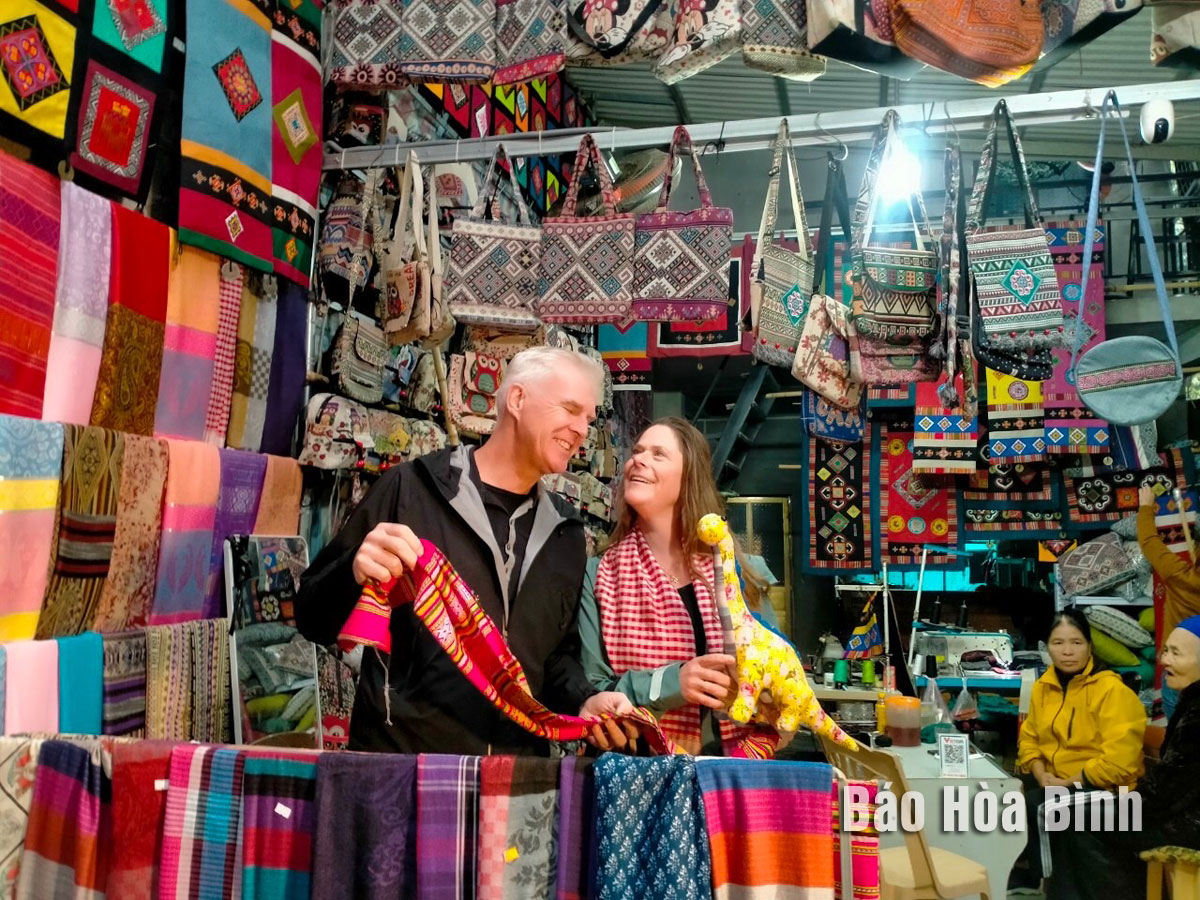
F. Martine from France and many other tourists from around the world have shown their excitement when joining Thai ethnic people of Mai Chau district in the traditional "sap” and "keng loong” dances.
Photo: By turning culture into a tourism product, Mai Chau
district has welcomed tens of thousands of international visitors each year.
(Photo: F. Martine and her husband from France experience special cultural
identities of ethnic groups in Mai Chau district).
Culture turned into
tourism product
F.Martine said she is very excited to try the
energetic "sap” dance (a dance with bamboo poles), adding that all people dance
hand in hand and all are very friendly.
like the French tourist, many other foreign
visitors to Mai Chau are also surprised by the creativity of locals who
invented various dances and sounds from just simple bamboos, poles or tree
trunks.
Lo Van Hep, Vice Chairman of the People’s
Committee of Na Phon commune, said "sap” and "keng loong” dances were
previously performed only in traditional festivals. However, with the strong
development of community-based tourism, many travellers have come and expressed
their wish to learn about and experience the culture of local ethnic groups. To
meet their demand, hamlets in his commune established musical troupes to help
tourists experience "sap” and "keng loong” dances, thereby helping preserve and
introduce the culture of the local Thai Trang (White Thai) ethnic people.
Hoang Duc Minh, Vice Chairman of the People’s
Committee of Mai Chau, said that the district, home to diverse ethnic groups
and rich traditional culture, has tapped into its beautiful natural landscapes
and special cultural identities to attract tourists and gradually turn tourism
into a key economic sector.
The preservation and promotion of ethnic groups’
cultural heritage in community-based tourism have been carried out effectively.
Particularly, Mai Chau has worked to uphold the costumes, folk songs and folk
dances, along with the traditional looms and stilt houses of Thai people. That
has helped visitors learn about local cultural identities and turn culture into
a unique tourism product drawing domestic and international tourists to the
district.
Archaeological relic
sites transformed into tourist destinations
Over the recent past, Mai Chau has gradually
turned archaeological relic sites into destinations for travellers.
Ngan Van Tuan, head of the district’s culture
and information division, noted there are now five historical, cultural, and
landscape relic sites recognised by the Ministry of Culture, Sports and Tourism
in Mai Chau, namely Khoa Cave (Xam Khoe commune), Mo Luong and Chieu caves (Mai
Chau township), and Lang and Pieng Kem caves (Chieng Chau commune). Among them,
Khoai and Lang caves are among the 10 typical archaeological sites of the Hoa
Binh Civilisation and listed as national-level ones.
To bring into play the special values of those
archaeological sites, the district has carried out a number of measures,
including capitalising on the sites for tourism development. Archaeological
findings have shed light on the formation and development of the Hoa Binh
Civilisation and also created chances for Mai Chau to diversify cultural
tourism products to serve local residents and visitors’ exploration and
research demand, he went on.
Mai Chau will mobilise resources for preserving
cultural heritage and bringing into play archaeological sites’ values to fuel
tourism development, the official added.
With its strategic location, well-developed transport network, and diverse soil and climatic conditions, Hoa Binh is emerging as a must-visit destination in Vietnam's northwestern tourism corridor. The province boasts numerous attractions, including the Kim Boi hot springs (Kim Boi district), the Dau Rong cave complex (Cao Phong), the Mai Chau valley (Mai Chau), and the iconic Hoa Binh hydropower plant.
The northern mountainous province of Hoa Binh has been listed among the 71 most beautiful places to visit worldwide by the prestigious US travel magazine Condé Nast Traveller.
Hoa Binh province’s rich natural and cultural resources position it as a prime location for developing community-based tourism (CBT). In recent years, support from central and provincial policies, as well as assistance from non-governmental organisations, have encouraged local ethnic minority and mountainous communities to actively engage in the sector.
Van Son Commune, Tan Lạc district, Hoa Binh province also known as "Cloud Valley," boasts a cool climate, stunning natural landscapes, and majestic scenery. Visitors who have been to this place should make a stop at Chien Hamlet to experience a lot of fascinating things and feel the friendly, warmth of the Muong ethnic people.
Thanks to the effective exploitation of natural landscape and the cultural diversity of ethnic minorities, Hoa Binh province has become an attractive destination for tourists seeking experiences and exploration.



